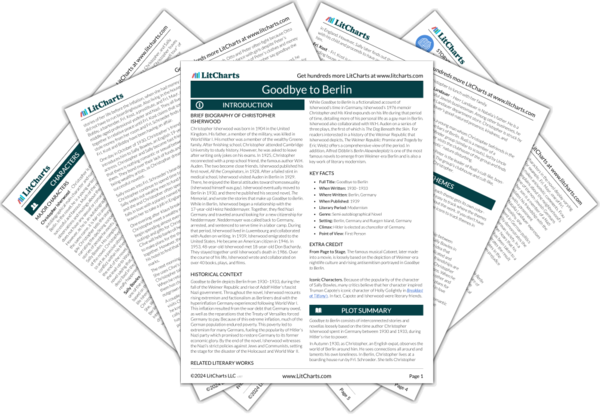Christopher Isherwood’s chronicles of the preexisting and rising antisemitism in Germany in the 1930s presents an example of the ways that political and social movements develop over time. The events of the novel begin in 1930, around the time that Christopher arrives to Berlin. By the time of the novel’s publication in 1939, the antisemitic actions and military actions of Hitler’s Nazi party would have progressed much further than in the time of the novel’s writing. As a result, any reader of Goodbye to Berlin will view the instances of antisemitism in the novel as a grim forewarning of the events to come. Isherwood offers many examples of the growing Nazi party’s presence in society—for example, while vacationing on Ruegen Island, he sees a small child carrying a Nazi flag and singing a nationalist song. Furthermore, the struggle for power between the communist party and the Nazi party appears many times throughout the novel.
Many of the non-Jewish characters in the novel display varying degrees of antisemitism. For example, Frl. Mayr, one of Frl. Schroeder’s boarders, often makes antisemitic comments. Frau Nowak, on the other hand, complains about the neighborhood’s Jewish tailor but insists that none of the non-Jewish Germans would ever turn on him, though her son is a member of a Nazi youth group. Later, Christopher relates his friendship with the Landauers, a wealthy Jewish family with a prominent department store. The 18-year-old Natalia Landauer expresses her feeling that, although her family is wealthy, she understands that the antisemitism present in German politics puts this wealth at risk. This lack of security demonstrates the extent to which antisemitism pervaded German society. In a tragic turn, after he leaves Berlin, Christopher hears that his friend Bernhard Landauer (Natalia’s cousin) has been taken to a labor camp and killed. This escalation demonstrates the result of the building antisemitism that Isherwood relates in the novel, revealing the devastating possibilities when prejudice meets political power.
Antisemitism in Germany ThemeTracker

Antisemitism in Germany Quotes in Goodbye to Berlin
A Nazi journalist reminded his readers that tomorrow, the fourteenth of July, was a day of national rejoicing in France; and doubtless, he added, the French would rejoice with especial fervour this year, at the prospect of Germany’s downfall. Going into an outfitters, I bought myself a pair of ready-made flannel trousers for twelve marks fifty—a gesture of confidence by England.
The other morning I saw a child of about five years old, stark naked, marching along all by himself with a swastika flag over his shoulder and singing “Deutschland über alles.”
“He’s going round to his Nazis, I suppose. I often wish he’d never taken up with them at all. They put all kinds of silly ideas in his head. It makes him so restless. Since he joined them he’s been a different boy altogether… Not that I understand these politics myself.”
The whole neighborhood owed [the Jewish tailor] money. Yet he was not unpopular: he enjoyed the status of a public character, whom people curse without real malice. “Perhaps Lothar’s right,” Frau Nowak would sometimes say: “When Hitler comes, he’ll show these Jews a thing or two. They won’t be so cheeky then.” But when I suggested that Hitler, if he got his own way, would remove the tailor altogether, then Frau Nowak would immediately change her tone: “Oh, I shouldn’t like that to happen. After all, he makes very good clothes. Besides, a Jew will always let you have time if you’re in difficulties. You wouldn’t catch a Christian giving credit like he does… You ask the people round here, Herr Christoph: they’d never turn on the Jews.”
“I await always that the worst will come. I know how things are in Germany today, and suddenly it can be that my father lose all. You know, that is happened once already? Before the War, my father has had a big factory in Posen. The War comes, and my father has to go. Tomorrow, it can be here the same.”
“You, Christopher, with your centuries of Anglo-Saxon freedom behind you, with your Magna Carta engraved upon your heart, cannot understand that we poor barbarians need the stiffness of a uniform to keep us upright.”
“I’m getting rather tired of what you call your experiments. Tonight wasn’t the first of them by any means. The experiments fail, and then you’re angry with me. I must say, I think that’s very unjust… But what I can’t stand is that you show your resentment by adopting this mock-humble attitude… Actually, you’re the least humble person I’ve ever met.”
In May, I left Berlin for the last time. My first stop was Prague—and it was there, sitting one evening alone, in a cellular restaurant, that I heard, indirectly, my last news of the Landauer family.
Last night, Fritz Wendel proposed a tour of the “dives.” It was to in the nature of a farewell visit, for the Police have begun to take a great interest in these places. They are frequently raided, and the names of their clients are written down. There is even talk of a general Berlin clean-up.
I catch sight of my face in the mirror of a shop, and am horrified to see that I am smiling. You can’t help smiling, in such beautiful weather. The trams are going up and down the Kleistrasse, just as usual. They, and the people on the pavement, and the tea-cosy dome of the Nollendorfplatz station have an air of curious familiarity, of striking resemblance to something one remembers as normal and pleasant in the past—like a very good photograph.
No. Even now I can’t altogether believe that any of this has really happened…











